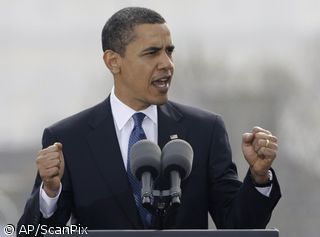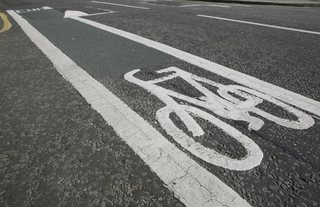Flashmobs are the latest craze in Europe this summer
Published:
18 August 2003 y., Monday
Flashmobs are the latest craze in Europe this summer. It’s another scorching day in Berlin, and on the Alexanderplatz in the city’s center, people are sitting on the edge of a fountain, hoping to catch some relief from the heat. A few are standing around in curious expectation. An Internet site had said a flashmob would take place at 5:00 p.m. But at 4:59 there was no trace of anything out of the ordinary.
Then at five on the dot, a circle of some 10 people suddenly convened around the fountain from out of nowhere. They were all young men in their 20s. Each took off his left show and passed it to his neighbor. Within about 15 seconds, the shoes had made a full circle and were back with their owners. The men gave themselves a high-five and dispersed without a trace. All that was left after their departure were amused and slightly confused onlookers, wondering what they just say.
Flashmobs, or spontaneous gatherings of people engaged in somewhat pointless activities, are the most recent U.S. import. In June of this year, the first such event took place in a Macy’s department store in New York. Since then, the concept has spread quickly across the United States, and leapfrogged over to Australia, Singapore and, as of the end of July, made its way to Europe.
In Germany, flashmobs have become very popular among a mostly young, computer-savvy group. More than 150 towns and cities have been the sites for the blitz-like gatherings, and in Berlin, at least two or three of the brief nonsensical events are announced every day on various Web sites, e-mail lists and mobile phone messages.
Šaltinis:
dw-world.de
Copying, publishing, announcing any information from the News.lt portal without written permission of News.lt editorial office is prohibited.
The most popular articles
 On 15 October, the President of the EP unveiled the names of the winners of the EP Prize for Journalism 2009.
more »
On 15 October, the President of the EP unveiled the names of the winners of the EP Prize for Journalism 2009.
more »
 “Lisbon treaty” - you may have heard quite a bit about it recently. Still baffled?
more »
“Lisbon treaty” - you may have heard quite a bit about it recently. Still baffled?
more »
 The 2009 World Food Day on 16 October is marked by an EU stronger than ever in its commitment to improve access to food around the world.
more »
The 2009 World Food Day on 16 October is marked by an EU stronger than ever in its commitment to improve access to food around the world.
more »
 One of the first signs of the new political mood in the European Parliament after the election is the reversal of its position over rules on working times for lorry drivers.
more »
One of the first signs of the new political mood in the European Parliament after the election is the reversal of its position over rules on working times for lorry drivers.
more »
 Do you feel like doing a 5-month traineeship in the European Parliament? If so then Thursday 15 October is the deadline to apply.
more »
Do you feel like doing a 5-month traineeship in the European Parliament? If so then Thursday 15 October is the deadline to apply.
more »
 The European Commission has provided € 32 million in assistance to 22 African Caribbean and Pacific (ACP) countries 1 over a period of 6 years to help fight poverty and to increase access to and quality of sexual and reproductive health services and commodities.
more »
The European Commission has provided € 32 million in assistance to 22 African Caribbean and Pacific (ACP) countries 1 over a period of 6 years to help fight poverty and to increase access to and quality of sexual and reproductive health services and commodities.
more »
 Challenging a long-standing taboo, U.S. President Barack Obama made a pledge to end restrictions on gays in the U.S. military.
more »
Challenging a long-standing taboo, U.S. President Barack Obama made a pledge to end restrictions on gays in the U.S. military.
more »
 The economic crisis has pushed an extra 90 million people into extreme poverty in the developing world and made 23 million people unemployed.
more »
The economic crisis has pushed an extra 90 million people into extreme poverty in the developing world and made 23 million people unemployed.
more »
 In the Chinese capital where the nation's one-child limit is rigidly enforced twins, triplets and quads get together to celebrate the fact they have brothers and sisters.
more »
In the Chinese capital where the nation's one-child limit is rigidly enforced twins, triplets and quads get together to celebrate the fact they have brothers and sisters.
more »
 It's called the Brompton folding bike world championships but it really is an awfully British affair.
more »
It's called the Brompton folding bike world championships but it really is an awfully British affair.
more »